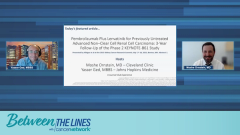
Durability of Response and Histology-Specific Insights
Panelists discuss how the durability of response data was particularly compelling, with a median duration of response of approximately 2 years and 35% of patients maintaining responses at 3 years, especially noting the surprising 31% response rate in chromophobe renal cell carcinoma (RCC) despite this histology's historically poor responsiveness to immunotherapy due to low tumor mutational burden.
Episodes in this series

Durability of Response and Histology-Specific Insights
The most surprising finding from the KEYNOTE-B61 study was the substantial activity observed in chromophobe RCC, a histologic subtype that has historically been considered poorly responsive to immunotherapy due to its low tumor mutational burden. Previous retrospective studies and the prospective nivolumab plus cabozantinib study from Memorial Sloan Kettering had demonstrated limited immunotherapy responsiveness in chromophobe tumors. However, the KEYNOTE-B61 study showed response rates of 26% to 27% in initial reports, which increased to 31% in the updated follow-up analysis. Additionally, 76% of patients with chromophobe RCC experienced tumor reduction, making this combination particularly valuable for a histology that can be challenging to treat and often requires multiple therapeutic approaches, including surgery.
The durability of responses represents another compelling aspect of the KEYNOTE-B61 results, with a median duration of response approaching 2 years. This extended duration is particularly remarkable when placed in historical context, as previous treatment options for non–clear cell RCC typically provided much shorter periods of disease control. The sustained benefit demonstrates that when patients respond to pembrolizumab plus lenvatinib, they tend to have meaningful and prolonged clinical benefit, which is crucial for patient quality of life and long-term outcomes in this challenging disease population.
At the 3-year follow-up mark, 35% of responding patients maintained their responses, highlighting the potential for long-term disease control in a historically difficult-to-treat population. These data represent a paradigm shift in expectations for non–clear cell RCC treatment outcomes. The combination of high response rates (approximately 51%), substantial disease control (82%), meaningful complete response rates (10%), and durable responses establishes pembrolizumab plus lenvatinib as a new standard of care for patients with advanced non–clear cell RCC, fundamentally changing the treatment landscape for this heterogeneous group of malignancies.
Newsletter
Stay up to date on recent advances in the multidisciplinary approach to cancer.



































